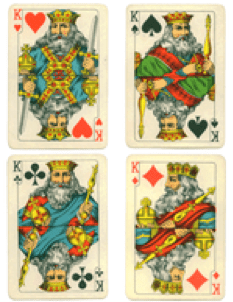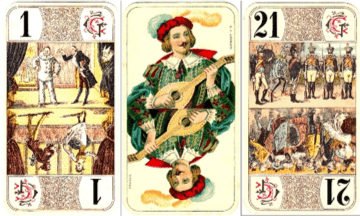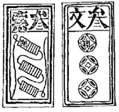Introduction
This page is a collection of ways to classify games and brief explanations for them. The most popular way to classify games is by mechanism but below you will also find games classified by objective. Also, on this page are a few examples of card types commonly used and some history and descriptions of them.
Mechanism
Games are most commonly classified by mechanism. This is because games tend to change over time becoming more complicated in nature to make for a more entertaining and fun experience for players, but games tend to keep the same basic mechanics of play. Games usually may have different end goals but more often than not you can generally wrap your head around a game by connecting similar experiences from other games. That is the main reason to classify games by mechanic.
Below is a chart of the five main categories of mechanism: outplay, exchange, comparison, patience, and others. These are then divided into smaller groups of games in which some are divided by objective.
Categories
Outplay Games
| This is the largest collection of games. This classification has each player playing out cards from their hands. This is usually to achieve some effect or objective. Play usually ends when you or all players run out of cards to play. |
- Trick-taking Games: These games consist of players trying to win tricks. A trick is when all players turn over a card from their hands and compare. There are a few different types of trick-taking games, described more in detail on the trick-taking page.
- Beating Games: These games consist of players either beating a previously played card or having to take it (or possibly all previously played cards) into their hand. The objective is usually to have no cards in hand.
- Climbing Games: These games give players the option of passing if they cannot or wish not to beat the previously played card.
- Adding Games: These games have all cards played into a pile and their values summed. This usually has an objective to achieve or avoid certain totals.
- Fishing Games: These games have a pool of cards face-up on a table which can be captured by playing matching cards from your hand.
- Matching Games: These games have players playing out cards on each of their turns that either matches the previously played card or fits into a layout. The objective is usually to get rid of all your cards.
- War games: These games have players holding piles of face-down cards. Play consists of each player simultaneously turning over cards to play them. These cards can then be captured by the other player under certain circumstances and added to their pile of cards.
Card Exchange Games
This classification has players exchanging cards from their hands with either cards from the table or other players hands. This is usually to achieve collecting a particular card or combination of cards.
- Draw and Discard Games: These games consist of players drawing cards from a stockpile and discarding cards to another pile.
- Commerce Games: These games consist of players exchanging cards from a common pile of cards.
- Cuckoo Games: These games consist of players trying to exchange their single card from their neighbors’ single card.
- Quartet Games: These games consist of players asking other players for cards they want and if the player has said card they must give it to the player who asked for it.
- Card Passing Games: These games consist of players passing a card or cards to your neighbor, or in some games taking cards from your neighbor.
Hand Comparison Games
In this classification players usually, do very little card playing. The game is instead played by comparing the hands dealt to each player to see who has the best set of cards by the game’s standard. Or alternatively flipping cards and comparing them to see who wins or loses. In some games, there may be a period where players attempt to improve their hands by drawing extra cards or choosing the positions of cards in their hands. This category consists of mostly gambling games.
- Showdown Games: These games consist of players comparing hands, or parts of their hands, and the player with the best hand is the winner, or in some cases, the player with the worst hand is the loser.
- Vying Games: These games consist of players comparing hands, but before the comparison players may raise the stakes of the game, and players may choose to drop out of the hand.
- Banking Games: These games do not have players playing against each other. Instead, players play individually against a banker.
Patience games
This category of games usually consists of a player or players sorting a deck of cards into ranking order from elaborate layouts by following certain rules to move cards from one position to another.
- Single Player Solitaire: These games consist of a single player who tries to sort a layout of cards into ranking order. If they are successful they win and if not, they lose.
- Competitive Solitaire: These games consist of players competing to complete ordering the layout into order.
Other Games
This category of games consists of games that do not fit into any of the above categories.
- Combat Games: These games consist of players using a fighting force made up of cards to attack other players’ forces. Since sometimes cards are discarded and replenished some of these games could be considered draw and discard games.
- Compendium Games: These games consist of two or more mechanisms being used in succession or alternated.
- Race Games: These games use cards to move tokens or other cards across a board.
- Role Games: These games use cards to identify roles to players.
- Miscellaneous Games: These games do not have any mechanisms to assign them to the above groups.
Objective
This section classifies games by what is needed to win the game.
Capture cards
These games consist of players attempting to capture cards or avoid having their cards captured by other players. It may be the goal to have a certain number of cards or some cards may have more value than others.
Shedding or Accumulating Cards
These games consist of players getting rid or acquiring cards to achieve a goal.
Forming Combinations of Cards
These games the goal is to score points by combining cards in certain ways.
Comparing Cards
These games consist of players comparing cards to see who wins.
Other Objectives
This category consists of games that do not fall into any of the above characters.
Card Types
French Suited Cards

This set of cards consist of four suits labeled: hearts, spades, diamonds, and clubs. There are usually three pictured cards in each set (King, Queen, Jack) and numeric cards 2 through 10. There is also an ace of each suit that can be either representative of the 1 or the highest-ranking card. There are also usually two jokers in each pack.
French Suited Tarot Cards

This set of cards consist of four suits: hearts, spades, diamonds, and clubs. Each suit has four pictured cards (king, queen cavalier, and jack). There are 21 trump cards distinguished by the Arabic numerals and a fool card which has no markings except for an illustration of some kind of jester or musician.
Money Cards

This set of cards are distinguished by their long and narrow make. They are traditionally oriental and typically have three to four suits. These suits are called cash, strings, tens of thousands, etc. This corresponds to money. Each suit has numeric cards 1-9 and some special cards in each pack.
Number Cards

This set of cards consist of cards that have numbers assigned to them instead of suits. Suits are exchanged with different numeric styles or colors.